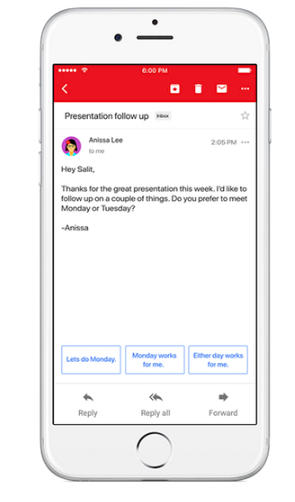 Editor's note: This article was originally written by Loraine Burger, published on Simplilearn, and has been reprinted with permission. Burger is a content marketing specialist with more than ten years of experience in technical writing, content management, social media strategy and analytics.
Editor's note: This article was originally written by Loraine Burger, published on Simplilearn, and has been reprinted with permission. Burger is a content marketing specialist with more than ten years of experience in technical writing, content management, social media strategy and analytics.
 The most astounding takeaway from Paul Roetzer’s presentation at INBOUND was the amount of misinformation and false hype around the reality of Artificial Intelligence (AI). Roetzer, who’s the CEO and founder of PR 20/20 and Marketing Artificial Intelligence Institute, unleashed a slew of examples of what AI is and what it isn’t, leading to an informative discussion about what digital marketers can be doing right now to prepare for future innovations.
The most astounding takeaway from Paul Roetzer’s presentation at INBOUND was the amount of misinformation and false hype around the reality of Artificial Intelligence (AI). Roetzer, who’s the CEO and founder of PR 20/20 and Marketing Artificial Intelligence Institute, unleashed a slew of examples of what AI is and what it isn’t, leading to an informative discussion about what digital marketers can be doing right now to prepare for future innovations.
What AI Really Is
Gmail smart replies is a great example of the current state of AI because it’s one most people are familiar with, even if you haven’t personally used it.

The machine behind the feature is actually reading every piece of text, training the algorithm to better predict language. Currently, the result is multiple short reply options, but that will eventually lead to predicting the rest of your sentences, similar to what auto-fill search queries do now.

“If Google has this technology, how long until it [penetrates] what we’re doing in digital marketing?” Roetzer posed to attendees.
What It Isn't
AI is not exactly the threat many marketers portray it to be. One huge misconception is that it will reduce or eliminate the human factor of brands. If anything, AI has the potential to allow brands to be more human than ever. It’s ability to cater to customers at an individual level is unprecedented, and the monotonous tasks that will be lifted from marketers’ shoulders will allow them to focus on the brand and its customers more than ever.
It also won’t wipe out jobs instantly.
“You don’t just flip an AI switch,” said Roetzer.
Even if you do have responsibilities that will be automated, the training it takes for machines to develop the algorithms needed to take on these jobs will take five or more years, depending on the task.
“The future is very much marketer plus machine working together. It will enhance what we are able to do,” said Roetzer.
Chatbots seem to be one of the first examples people lean on when discussing AI, but the reality is, chatbots—at least the ones we’re interacting with today—are hardly examples of AI.
Of course, there are exceptions, but the vast majority of bots are built with human coding, meaning the responses you receive are written and programmed by humans. While there is some AI in the works here, it’s not as advanced as many think.
What AI Will Do
Can we build our marketing strategies more intelligently using machines? Well, that’s the idea. Imagine what AI will be able to do for events, for example. Marketers and event managers have been finding brilliant ways to tailor the event experience for attendees. But, as Roetzer pointed out, “How do you customize experience of INBOUND [conference] for 24,000 people? You can’t.”
With AI intelligence, a truly customized event experience becomes very possible, by leveraging the attendee data in a way humans couldn’t possibly do at scale.
AI will also work alongside marketers, taking some of the more monotonous tasks off their plates entirely. Roetzer predicts email subject lines will be written by machines, and custom send times will be decided by machines, to optimize open rates by sender. (If you’ve ever wrestled with email subject lines or A/B tested best send times, you’ll agree, this is great news.) Now you have more time to write and strategize.
Here are a few other digital marketing tasks Roetzer says we can look forward to become automated and managed by AI:
- Building buyer personas
- Defining topics and titles for content calendars
- Determine marketing goals based on historical data and forecasted performance
- Adjusting digital ad spend in real time
- Identifying social media trends
- Forecasting campaign results based on predictive analytics
Where Do We Go From Here?
There is still a ton of education to be taught around AI and the best ways to use it. If you’re having this discussion with your teams right now, you’re still ahead of the game.
“The companies you would think would be leading the AI front aren’t doing this on their marketing teams,” said Roetzer. “It can be your competitive advantage.”
In a consulting role, Roetzer is often speaking to outside businesses about the role AI can play in digital marketing. That conversation often starts with, “We need AI to do this,” to which he replies, “Tell me about the business problem you have, not that you need AI. At the end of the day, it’s still a technology that may help you solve the business problem.”
Here’s what he advises companies that are anxious to get started:
- Create a spreadsheet and start documenting the tasks you and your team do repeatedly. In another column, note how frequently these tasks are performed, and in another, give each task a value (that you can later filter by value). That way, you begin to formulate what your biggest priorities are, and how much time they take away from other tasks.
- Reevaluate the data you collect, and assess the opportunities to get more useful information from that data. If your business is like most companies, a majority of the data you collect from your customers is “dark” data, or untouched, unused information that you can and should be leveraging. How to leverage that data will take some creative brainstorming and some research.
- Consider the AI capabilities of your existing marketing technology stack. Is there any low-hanging fruit that you can begin optimizing?
- Make ethics a part of the conversation, now. Data ethics makes headlines globally today, and that will only grow as AI becomes the norm. Before you get into the weeds of developing an AI strategy, understand that your company will have massive amounts of user data, and how and why you use that data matters.
AI has a valuable place in digital marketing, and we’ll start to see which businesses are taking advantage of it in the next few years. If you’re afraid you’re late to the game, rest assured, AI integration is just getting started.
For a foundational understanding of AI and it’s capabilities, check out our Introduction to AI training. We also offer Machine Learning training, and our Digital Transformation Academy provides a thorough education for executives on these technologies and how businesses can begin using them.
Want even more advice on how to get started with AI?
Select below.
%20Logo_BlueOrange_Trademark.png?width=800&height=269&name=Ready%20North%20(RN)%20Logo_BlueOrange_Trademark.png)




.jpg?width=300&name=Services%20Hub%203%20(3).jpg)


COMMENTS